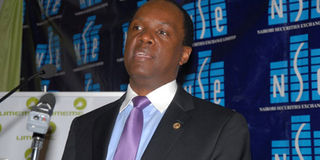Regional finance firms in new bid to launch East Africa lobby group

Umeme limited board of directors chairman, Patrick Bitature speaks during the listing of the company's share at the Nairobi Securities Exchange (NSE) on December 14, 2012. The Pan-East African Community Financial Services Providers Council will be tasked with participating in the development of the region’s financial sector policy and participating in regulatory reviews.
What you need to know:
- The CEOs also recommended that the EAC airspace be declared domestic for all craft from the five partner states.
Financial service firms in the regional economic bloc on Friday signed a deal to establish a lobby group for the sector.
The Pan-East African Community Financial Services Providers Council will be tasked with participating in the development of the region’s financial sector policy and participating in regulatory reviews.
“Overall, the Pan-EAC Council aims at achieving development and integration of the financial sector within the region,” read a statement from the EAC.
The council will comprise, among others, East African Insurers Association, East African Bankers’ Association, East African Securities Exchange Association.
Seamless services
It comes amid growing integration in the financial sector as the expansion of local businesses fuels demand for seamless services.
In January, the African Development Bank (AfDB) gave a Sh1.9 billion grant to speed up the creation of the EAC Payment and Settlement Systems Integration Project which is expected to increase the speed and volume of transactions in the region.
Despite these initiatives, the slow rate of regional integration has come under criticism from various fronts over the past few weeks.
In a Kampala chief executives forum last week, business leaders from the region demanded that the EAC gets rid of non-tariff barriers to trade by expediting the harmonisation of tax laws and work permit regimes.
“EAC partner states should fast track ratification of the Agreement on Avoidance of Double Taxation,” read part of a presentation by the business leaders.
The CEOs also recommended that the EAC airspace be declared domestic for all craft from the five partner states.
The region was also asked to sign bilateral air service agreements with other economic blocs.
The EAC enacted the Customs Union protocol in 2005 thereby adopting common external tariff for goods and scrapping internal tariffs.
In 2010, the region operationalised the Common Market Protocol, which was expected to guarantee free movement of labour and capital.
However, a February review of the regions’s progress in implementing the Common Market Protocol revealed that all five states were lagging behind due to limited funding and failure to harmonise national laws with those of the region.




